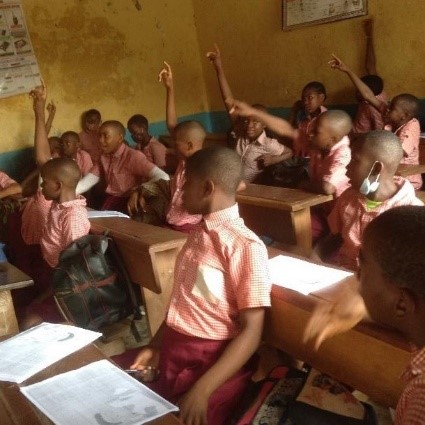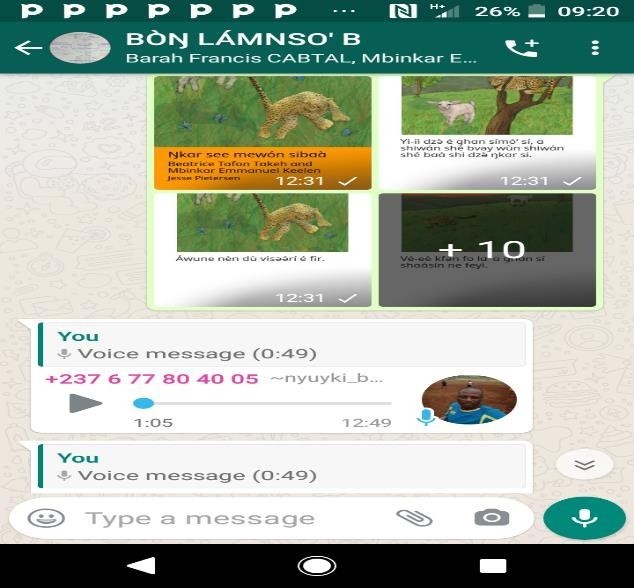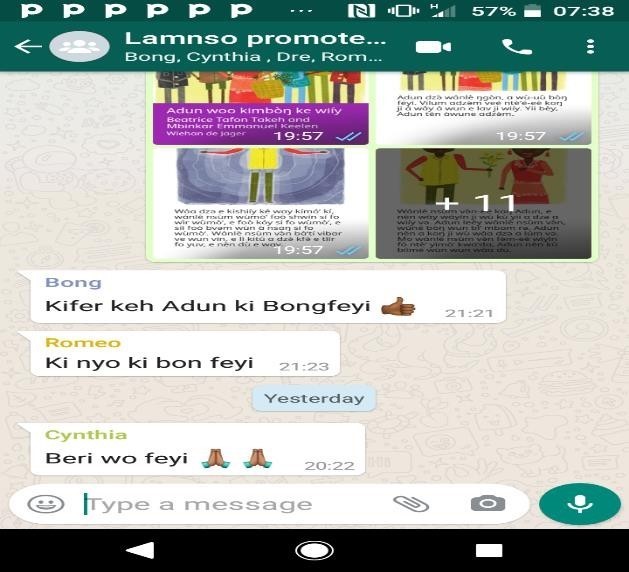

The availability of digital openly licensed storybooks in, not only English and French, but also in local languages, has made it possible for children who cannot afford to buy storybooks, to read as much as they like, writes Beatrice Tafon Takeh the African Storybook (ASb) Champion in Cameroon.
Beatrice Tafon Takeh is very active in encouraging and supporting the use of ASb books in and around Yaoundé, the capital. In this article she describes some of her recent experiences in schools and in the broader language communities sharing and using storybooks. Her reflection on her work usefully illustrates the importance of understanding the resource needs of each context. Reflecting further on her experience of working with teachers in a number of schools to introduce the African Storybook, Beatrice observed that,
ASb helps teachers to make use of reading lessons in the school timetables – previously this didn’t happen because reading material was unavailable or inadequate. Children now look forward to reading and even remind their teachers that it is a reading period if the teacher forgets or starts something different. Most children have improved in their reading practices, while, even the shy pupils are now able to volunteer to read. Teachers are keen for children to introduce the ASb website to their parents and (for them to) explore the stories together at home.
At Christ the King Bilingual Primary School in Nkolfulu-Yaounde, the African Storybooks were downloaded onto a flash disk and the teacher projected them onto the wall using a data projector and a computer. The children found reading the story, Monkey and the Twins, very interesting. The story is about bullying and greed. It teaches the importance of children not keeping secrets from their parents.
By engaging with the stories, the children also learnt new vocabulary. The teacher also used questioning as a method to assess whether the children had understood the story and some pupils were asked to dramatise the parts of the story. This made the reading lessons both instructive and fun!
In the French language classes at the same school, the children loved the story, La Maitresse Akiny (Mistress Akiny) which their teacher also projected onto the classroom wall for them to read. After reading the story, the teacher explained the meaning of new words and also asked specific questions about the story to check the children’s comprehension. Referring to the content of the story in this book, the teacher took the opportunity to discuss colours, history of great men and great women, means of transportation, and agriculture with her class. This storyline in this book also encouraged the teacher to ask some of the pupils in her class to tell a story of their own. Apart from the practice and enjoyment of reading, the story becomes a vehicle for a number of related learning activities.
But not all schools are able to use the storybooks digitally. All Saints Primary School in Bayele, a more rural town in Northwest Cameroon, does not have a projector or even the funds to download and print out some story books. This however, did not stop the teacher from thinking about the challenge and finding a creative solution. She downloaded the storybooks onto her mobile phone for reference. Then she cut up some cardboard and made a set of cards, one for each page of the book. She then copied and wrote one page of the story per card, until she had written out the whole story. She numbered all the pages and shared them among the children. She started by calling out the first page number and the child with that card would read out aloud to the class. With each child called to read one page, the class worked through the whole book together.
In another example, the same teacher copied the story, one of the shorter stories that she had downloaded onto her phone, onto the chalkboard and asked the class to read it, proving that where there is a will, there is a way!
 While at St Mary and Rita Primary School, Ngousso-Yaounde, yet another method of using the African Storybooks was evidenced. Here, the teacher was able to make black and white printed copies of the story, Duma says wash your hands . Recognising the importance of their children having the opportunity to practice reading, the school’s Parent Teacher Association (PTA) executive approved the printing budget. Colour printing was too expensive, so printing in black and white was agreed upon. The children loved this story because of its relevance to the current Covid-19 pandemic.
While at St Mary and Rita Primary School, Ngousso-Yaounde, yet another method of using the African Storybooks was evidenced. Here, the teacher was able to make black and white printed copies of the story, Duma says wash your hands . Recognising the importance of their children having the opportunity to practice reading, the school’s Parent Teacher Association (PTA) executive approved the printing budget. Colour printing was too expensive, so printing in black and white was agreed upon. The children loved this story because of its relevance to the current Covid-19 pandemic.
After reading the storybook, children who did not have their masks on, quickly put them on! The teacher used the opportunity to remind children to regularly wash their hands with soap or to use hand sanitizer, and to wear a fresh mask every day.
Cameroon has more than 230 languages and communities are encouraged to teach their children to read and write in their local languages. The Nso people located in Northwest region of Cameroon, take great pride in their traditions and culture and have worked very hard to promote the use of their language, Lamnso. To date, there are 48 approved storybooks written in the Lamnso language on the Asb website.
To promote the use of the Lamnso storybooks, Beatrice worked with two WhatsApp forums. The Bong Lamnso group has about 200 members, and the Lamnso Literacy Promoter’s Association (LALIPRA) which has about 150 members. Some parents in these two groups succeeded in downloading storybooks to read with their children on the African Storybook Reader App.


But for those who had challenges, Beatrice, made screenshots of the storybooks and posted on the WhatsApp groups each week, as illustrated in these two WhattsApp screen shots. She reported how, it did not matter to the parents and children what the level of the story was, they were just so excited that the storybooks were in Lamnso.